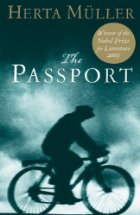The Passport. Translated by Martin Chalmers
The Passport is a Nobel Prize winning novel  describing the efforts of Windisch, the town miller, to move his family from a German village in Romania to the promise of West Germany. The novella is broken up into laconic chapters, titled with a simple image that often refers to a dream or a flashback, such as “spurge laurel” or “the earth frog.” The imagery depicting the trials of exile is often haunting, leaving the reader with a feeling of desolation. Müller also employs odd and rather contradictory symbolism, such as the Widow Kroner’s face growing younger before her death, and depicts feelings of anger and anxiety over being trapped in the village with stones. Another example of such symbolism is when stones are often described as being in the villagers’ heads, and when Windisch finally allows his daughter to be assaulted by the militiamen in order to receive passports, “a stone hangs in his ribs.”
describing the efforts of Windisch, the town miller, to move his family from a German village in Romania to the promise of West Germany. The novella is broken up into laconic chapters, titled with a simple image that often refers to a dream or a flashback, such as “spurge laurel” or “the earth frog.” The imagery depicting the trials of exile is often haunting, leaving the reader with a feeling of desolation. Müller also employs odd and rather contradictory symbolism, such as the Widow Kroner’s face growing younger before her death, and depicts feelings of anger and anxiety over being trapped in the village with stones. Another example of such symbolism is when stones are often described as being in the villagers’ heads, and when Windisch finally allows his daughter to be assaulted by the militiamen in order to receive passports, “a stone hangs in his ribs.”
Besides the desperate need for escape, a running theme of the novel is the degradation of women. German women are placed below Russian and Swabian women – Swabian meaning any German-speaking minority in Romania, Transylvania, or Hungary – because they cannot cook and they “whore around.” In fact, whenever a young woman is mentioned in The Passport, some sort of prostitution is implied, usually used in an effort to obtain food during the war. It is made apparent that Windisch has a strained relationship with both of the women in his life (wife and daughter) because they will so easily “spread their legs” for bread or legal documents, although it is hardly acknowledged that Windisch himself had slept with several women after returning from the war. Women are also characterized as selfish animals, crying only for themselves, and are often victims of domestic abuse throughout.
Furthermore, although the town in which the story takes place is predominantly German, Müller makes it evident that the German natives are not welcome in Romania. “[T]he Romanians were amazed that there were still Germans after Hitler. ‘Still Germans,’ the manager’s secretary had said, ‘still Germans. Even in Romania.’” This further adds to the crushing weight of alienation. Moreover, at the time the novel takes place the Romanian region was a police state under the rule of Dictator Ceausescu, who barely recognized the village’s existence. Thus, the village folk are oppressed with the stifling hopelessness of exile. Overall, through simple, short sentences, Müller is able to convey the bleak and violent existence of the characters in a surrealist manner.
by Traci Fitzharris
Read a book review at: http://www.guardian.co.uk/books
Read an extract from the book at: http://www.guardian.co.uk/books
